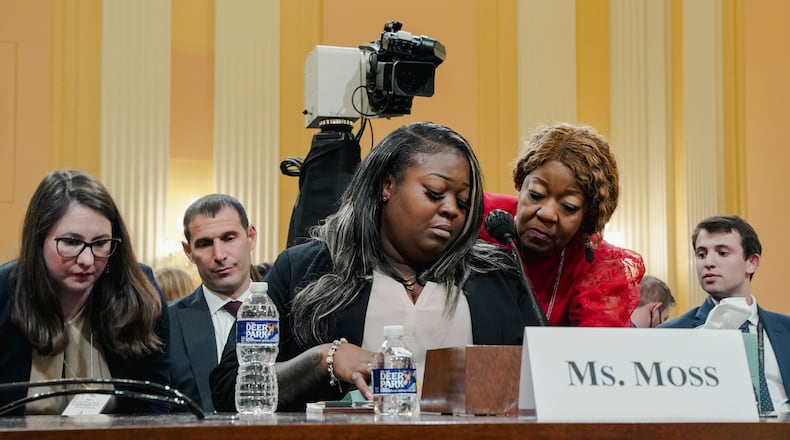As allies of then-President Donald Trump spread false allegations that Fulton County election worker Wandrea “Shaye” Moss had participated in ballot fraud, a supervisor suggested she brace herself for an onslaught via social media.
She opened up her rarely used Facebook page to find numerous threats from strangers who believed the election lies about Moss and her co-worker and mother, Ruby Freeman.
“Wishing death upon me, telling me that I’ll be in jail with my mother and saying things like ‘be glad it’s 2020 and not 1920,’ ” Moss, who is Black, told the U.S. House committee investigating the Jan. 6, 2021, riot at the U.S. Capitol.
Both Moss and Freeman, who sat behind her daughter during Tuesday’s hearing, were visibly shaken as they told the committee how their lives were upended after they were publicly identified by Trump and his allies as the source of election fraud and partially to blame for his loss in Georgia.
None of it was true.
They were among the local and state election officials who testified during the panel’s fourth public hearing to recount the false allegations of a stolen election and how it had affected them on both a professional and personal level. Georgia Secretary of State Brad Raffensperger and his chief deputy, Gabriel Sterling, also shared their own stories of resisting the pressure and the threats that followed.
But it was Moss and her mother, “Lady Ruby,” who provided the most powerful testimony. Freeman wiped away tears as she watched video of her own testimony, where she talked about receiving a call from the FBI encouraging her to move out of her home prior to Jan. 6 because of the threat of violence.
She placed the blame on Trump, the 45th president, and his confidant, Rudy Giuliani, among others.
“There is nowhere I feel safe,” Freeman told investigators. “Nowhere. Do you know how it feels to have the president of the United States target you?”
Moss told the committee that none of her co-workers shown in the video passed around by Trump loyalists are still employed as election workers. She and her mother have also moved on.
Trump’s allies asked Raffensperger to step down, but he told the panel he refused because he was resolute that he had done nothing wrong. Trump later endorsed a conservative rival, U.S. Rep. Jody Hice, to challenge Raffensperger in last month’s GOP primary, but the incumbent won handily.
Raffensperger said his wife received threatening texts, and someone broke into his daughter-in-law’s home.
Sterling testified that it was an online threat against a Dominion Voting Systems contractor in Gwinnett County that inspired the dramatic December 2020 press conference during which he urged Trump to “stop inspiring people to commit potential acts of violence.” The threat named the contractor, accused him of treason and included a noose.
Sterling said he “lost it.”
“I lost my temper,” he said of the press conference. “But it seemed necessary at the time because it was just getting worse.”
Raffensperger and Sterling debunked each of Trump’s fraud claims, including the ones about the State Farm Arena video. Sterling said the video “showed election workers engaged in normal ballot processing.”
There were no “suitcases” of ballots, as Trump claimed — just normal ballot storage containers. Ballots weren’t scanned and counted three times. No one smuggled in 18,000 ballots.
But Trump kept repeating the claims, and all the secretary of state’s investigations and explanations couldn’t compete with the president’s megaphone.
“I had family members who I had to argue with about some of these things,” Sterling testified.
The hearing highlighted Trump’s efforts to pressure state officials across the country. Arizona House Speaker Rusty Bowers testified about numerous calls and meetings in which Trump and his allies tried to persuade him to allow state lawmakers to overturn the election. He declined repeatedly, saying such a scheme would be illegal.
The hearing also highlighted Trump’s phone calls to Raffensperger and Frances Watson, the state’s lead investigator overseeing an audit of absentee ballot signatures in Cobb County.
In his call, Trump asked Raffensperger to “find” 11,780 votes — just enough for Trump to defeat Joe Biden. Raffensperger testified he had no basis for finding those votes. “We followed the law and followed the Constitution,” he said. “At the end of the day, President Trump came up short.”
Keep Reading
The Latest
Featured





